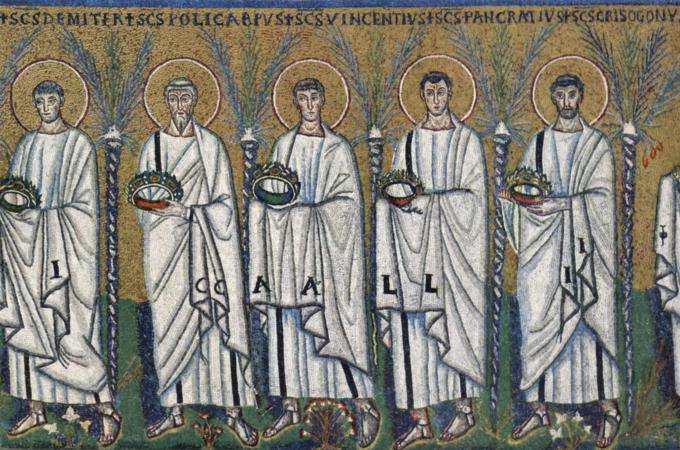The saint who refused to bow down to Caesar
The Church remembers the witness of Saint Polycarp today, who was killed because he would not renounce his faith in the Lord Jesus in the year 155 AD. Saint Polycarp was a victim of the brutal persecution of the Church by the Roman Empire, which afflicted the faithful for the first few centuries of the Church's life.
Polycarp was an elderly man when he died, so old that he had personally known the Apostle John. Saint Irenaeus mentions Polycarp's relationship with the Apostle John, noting that Polycarp, who knew John, was his own teacher and mentor.
The account of Polycarp's martyrdom has the saint making this appeal to the Roman magistrate who had offered to spare the elderly saint if he would just place a pinch of incense in a brazier burning before a statue of Caesar. Polycarp replied, "Eighty and six years have I served Christ, and he never did me any injury: how then can I blaspheme my King and my Savior?" Polycarp was tortured and his body burned. The destruction of his body was intended as an assault on Christian beliefs in the dignity of the body and the resurrection of the dead.
The reason for Rome's persecution of the Church is not always understood by Christians. It was not simply the case that the Roman system was intolerant of religion; as a point of fact, the Roman system was inherently religious and willing to sanction a diversity of cults.
The reason for Rome's persecution of the Church was that Christians proclaimed that Christ was an authority that was higher than that of Rome and its emperor. We call Christ "Lord and Savior" and do not realize that these terms are not just honorary titles or theological abstractions. Caesar held the titles "Lord and Savior" and would tolerate no rivals to this claim. That Christians would call Christ, who had died at the hands of Roman power, their "Lord and Savior" was an affront to Caesar's status and authority.
Further--and this might surprise you--the early Christians were called "atheists" because they refused to recognize the many gods of the Roman religion as worthy of reverence or worship. For these reasons, Christians were enemies of the state, and the Church was an illegal organization.
We live in a culture that has had a relatively benign relationship with Christians and the Church. The Catholic faith has not always been welcome in our nation's history, but over the past several decades many of the anti-Catholic attitudes have softened into a toleration of the Church, just as long as we can demonstrate that we are not a threat to the nation as agents of a foreign power and are sufficiently accommodating to modern secularism.
However, many Christians do not live in a situation that either tolerates the faith or allows its free expression. As massacres of Christians in Iraq, Egypt, and other nations of the Middle East have demonstrated, the experience of Saint Polycarp is not merely a matter of history. It continues today. In this regard, Saint Polycarp reminds us of a truth that takes us beyond our own experience and brings us face to face with the Lord's stinging words: "No slave is greater than his master. If they persecuted me, they will also persecute you..."
May Saint Polycarp intercede for us and give us the strength and courage to bear witness to the faith in the face of opposition and persecution.
- Father Steve Grunow is a priest of the Archdiocese of Chicago. He serves as CEO and Executive Producer for Bishop Robert Barron’s Word On Fire Catholic Ministries.
He writes on theology, movies, and popular culture for the Word on Fire blog.



















